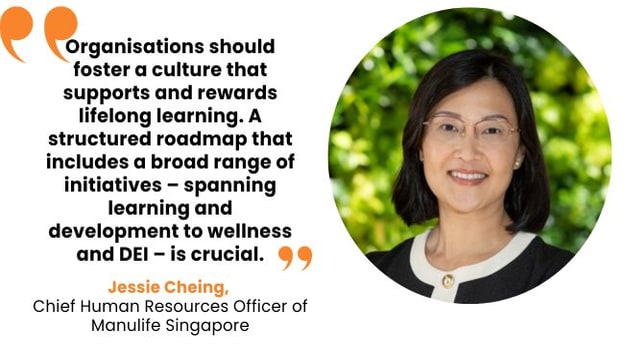Top agendas for HR: Building AI adaptability, fostering a growth mindset, and continuous learning

In an exclusive interaction with People Matters, Jessie Cheing, Chief Human Resources Officer of Manulife Singapore, discussed effective strategies for promoting a continuous learning work culture, upskilling and reskilling employees for AI technologies, and enabling L&D for a multi-generational workforce.
Here are the edited excerpts:
In your experience, what are the key strategies that have worked in promoting a continuous learning culture?
At Manulife Singapore, we are committed to fostering a culture of "learn-it-all" instead of the traditional "know-it-all". We align this globally while offering locally tailored programs on topics like leadership development, functional capabilities, and well-being.
To promote a learning mindset across the organisation, we've named every second Friday of the month "Fuel Up Friday" to support an afternoon of collective learning to explore new skills and deepen existing skills. Our Executive Leadership Team (ELT) plays an active role, leading "Fuel Up Friday" sessions to inculcate this "always-learning" ethos.
We also aim to create a safe environment for our people to take risks and embrace challenges and failures, so they are not afraid to stretch their existing skills and capabilities. Our multimodal learning ecosystem encompasses classroom training, social learning platforms, virtual webinars and site visits, making learning dynamic and engaging. We are humbled by recognition from industry bodies, which is a testament to our ongoing efforts to promote learning & development within the organisation. Among other accolades, we obtained the Skills Future Employer Gold Award in 2022 and the IBF Inspire Award for the second time in 2023.
What advice would you give to HR leaders looking to enhance their organisation’s commitment to lifelong learning?
The foundation lies in creating an environment that supports and rewards lifelong learning. A structured roadmap that includes a broad range of initiatives – spanning learning and development to wellness and DEI – is crucial.
It's also important to celebrate those who embody the organisation's spirit of learning. This can be done through recognition programs, which serve as a clear signal to other employees, motivating them to strive for their own developmental goals.
How does leadership, including the CHRO, play a role in fostering a culture of lifelong learning? Are there any mentorship or coaching programmes to train young talent? How do you ensure that senior management is actively engaged in such initiatives?
Leadership sets the tone. We believe in leading by example to foster growth within an organisation. Our senior leaders are always enthusiastic about sharing their insights and expertise with the rest of the team, taking on active roles during events such as our annual Learning Fiesta. This year’s edition opened with a panel discussion featuring executives like our Chief Executive Officer Dr Khoo Kah Siang, Chief Transformation and Operations Officer Benedict Jones, Chief Risk Officer Yeo Yee Han and myself, where we dived into AI and its impacts on the future of work.
Additionally, Manulife employs a holistic approach to workforce development, considering both the company’s needs and our employees’ ambitions. We use a 70:20:10 approach: 70% entails on-the-job development, which includes rotations, stretch assignments and projects; 20% is exposure to senior leadership through mentoring and coaching; the remaining 10% is development through learning programmes. Mentoring and coaching are highly tailored to an employee's development needs. Depending on their aspirations and skill gaps, we assign appropriate mentors or coaches. This holistic approach, where on-the-job experiences, mentorship, and formal programs synergise for comprehensive learning.
What emerging trends or technologies do you see shaping the future of workplace learning in the SEA region? At Manulife, how do you tailor lifelong learning programmes to meet the needs of a diverse workforce?
More and more learning occurs on-demand and through digital platforms, giving employees the flexibility and autonomy to take charge of their learning. We are also cognizant that employees have varied goals and aspirations, so there is no one-size-fits-all when it comes to L&D. At Manulife, the PURSUIT programme is a "one-stop shop" digital platform that offers a “Netflix for learning” kind of experience. It empowers employees to personalise and curate learning paths according to their own pace and interests and access modules anytime on their smart devices.
Additionally, we leverage LinkedIn Learning through PURSUIT, giving employees access to world-class online courses taught by experts across the globe. In a hybrid world where people are often pressed for time, providing them with self-directed, flexible, and tailored options is critical to help them continue learning.
How can organisations adapt to the changing nature of work and the skills required by employees? How is Manulife preparing its workforce for data-driven technologies?
We recognise the digital shift across various parts of our business, and our learning curriculum embeds relevant technology-focused courses to help employees adapt and prepare for the future of work. For example, we've placed a significant focus on "New Ways of Working," empowering our employees to learn skills such as human-centered design and advanced analytics. We also support Singapore’s national reskilling agenda, partnering with government agencies and leveraging national initiatives such as the Career Conversion Programme (CCP) to reskill our employees. As part of our talent development strategy, the company also actively recruits mid-career switchers and fresh graduates via the Technology in Finance Immersion Programme (TFIP).
We’ve also launched the Manulife Business Academy (MBA) to prepare our financial advisory representatives for holistic customer engagement in the digital era. The academy equips consultants with digital skills through a structured learning roadmap. This includes valuable modules on digital engagement - such as social media - and competencies in digital tools.
Have you encountered any generational differences in how employees perceive and engage with lifelong learning, and if so, how do you address these differences?
Lifelong learning has become increasingly important with the extension of retirement and reemployment age in Singapore. Generational differences are a reality that most companies face. Indeed, our workforce comprises five generations, each with distinct learning preferences. For instance, we’ve observed that Gen X individuals are generally more accustomed to formal training programmes, while Millennials and Gen Zs prefer digital platforms and self-directed learning. We've addressed these needs through multimodal learning environments, blending classroom sessions with experiential, online, and social learning avenues.
What strategies do you use to encourage cross-functional collaboration and knowledge sharing among employees? How do you encourage employees to share their knowledge and expertise with their peers, thereby contributing to a culture of continuous learning? Can you provide some examples?
Our organizational values and Leadership DNA are designed to encourage cross-functional collaboration and knowledge sharing. We strive to maintain a positive and supportive work environment where everyone feels empowered to share their thoughts and ideas. Our “Under the Manulife Hood Series” initiative is a peer-to-peer sharing that draws back a curtain on our business and operations.
Meanwhile, our annual learning fiesta includes peer-to-peer sessions about topics such as public speaking and increasing visibility on LinkedIn. We also encourage real-time collaboration by using avenues such as Teams channels, Mural, and project management tools to maintain open and ongoing dialogues.
With the increasing use of AI and automation, how do you foresee the role of HR evolving in the context of lifelong learning?
Leveraging emerging technologies like AI and virtual reality will be integral to the future of workplace learning as these solutions will enhance personalised learning experiences. Since learners have unique strengths, experiences, challenges, and preferences, personalisation is critical to support meaningful learning and improvement.
We're already leveraging technology through our Pursuit Learning platform to offer anytime, anywhere learning. The role of HR is becoming increasingly strategic, focusing on future-proofing the organisation and its employees. Strengthening our workforce’s adaptability quotient to embrace AI, building a growth mindset, and continuous upskilling and reskilling will be key agenda items for our HR team moving forward.














